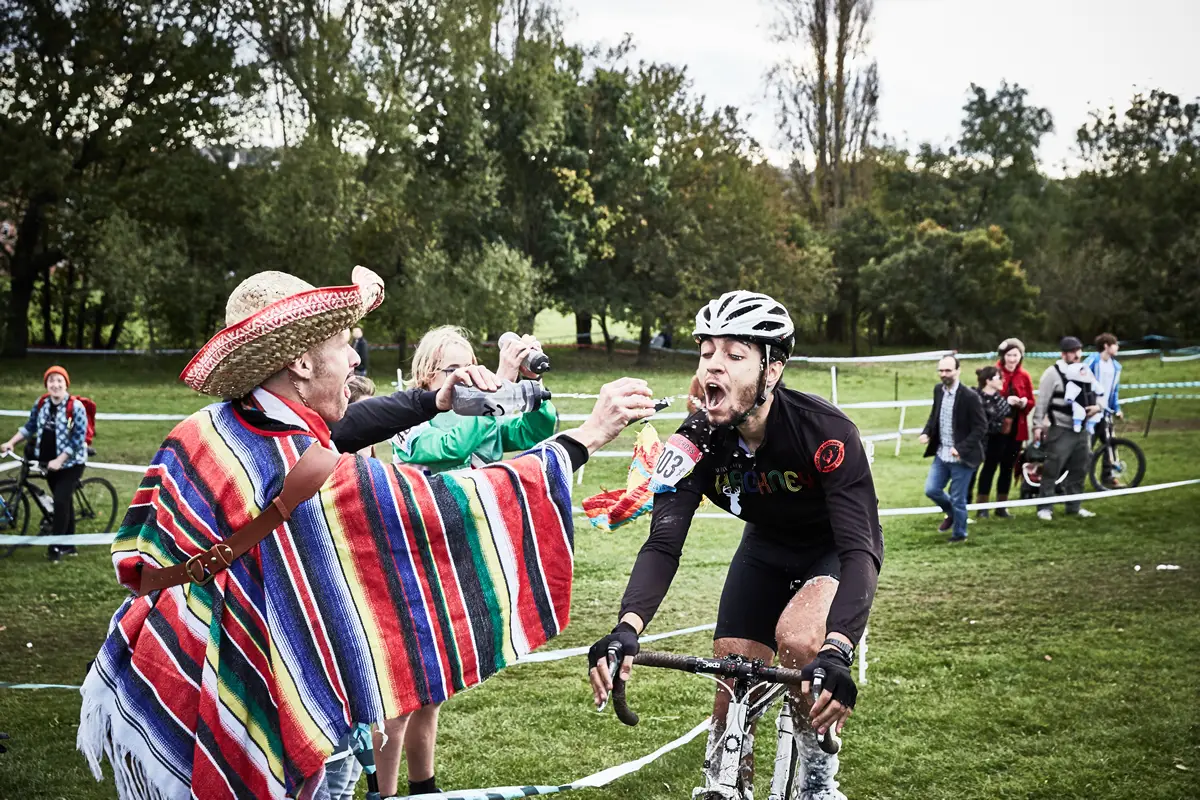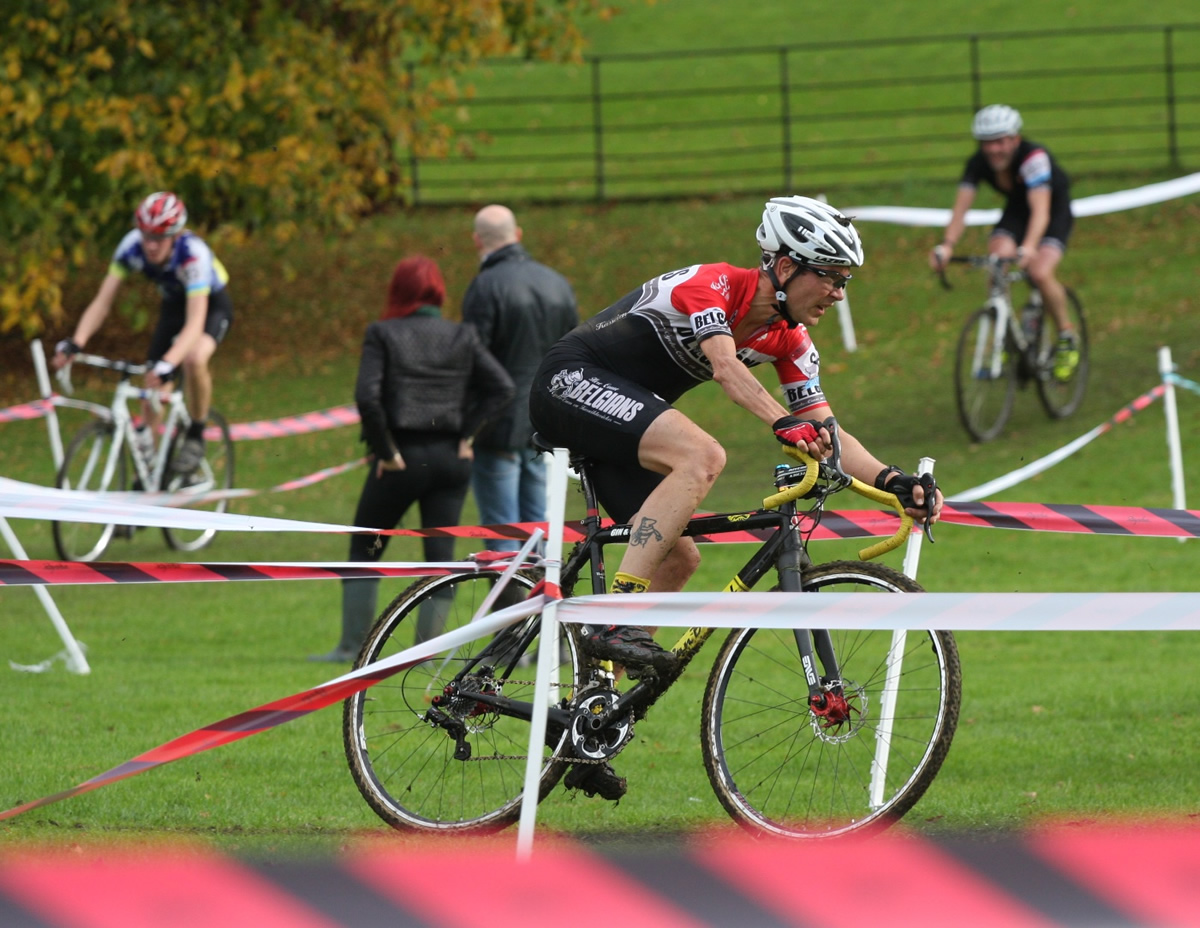The inside story of Rapha’s London Super Cross
Words by Duncan Moore. Photos by courtesy of Rapha and Jo Allen
Rapha has always done things a little differently, and it’s proven to be a very successful strategy for the London-based apparel business. So when it announced it was going to start promoting cyclocross races, people paid attention. Starting in 2011 with its Rapha Super Cross Series, the company joined a growing number of race promoters in the UK aiming to bring the attitude and culture of the ‘cross race scenes in Belgium and the USA to the motherland. Muddy fields in the middle of nowhere as race venues with the only spectators being friends and family were being swapped for prestigious locations with proper facilities as these numerous young upstart promoters began to swap polystyrene cups of lukewarm tea and soggy sandwiches for craft beers and artisan street food.
In Rapha’s case, the unlikely source of inspiration for this new style of ’cross racing in the UK was none other than Ian Cleverly of hardcore roadie magazine Rouleur, which was at the time published by Rapha. According to Laura Bower, Country Manager for the UK and Ireland at Rapha, he said to Simon Mottram, Rapha’s CEO, “I’ve had this great idea for a Super Cross race series.”
Laura takes up the story of just what that great idea involved. “We set out to introduce entertainment while at the same time making it really good racing for everyone; from novice to elite, from old to young, you name it. We want to make it great not just for the racers but for the spectators too, to make it somewhere where people would want to spend time. We knew we would need to bring in music and entertainment, stalls, great food and drink… The type of thing that is still missing at so many bike races.
“We added some silliness to the racing too. In the novice class, we introduced the tequila shortcut. At the same time, we wanted to make it a premium event for serious racers to attend. We aimed to inject a lot of life into a stale race scene and tried to get a lot more people and new people enthusiastic about ’cross and excited about coming to an event. We even had a brass band at the finish line for some of the races to get that element of fun and enjoyment. The whole idea was to get people interested and give this great sport its time in the limelight. The first year we did that the feedback was incredible. People were simply not used to such an experience.”
It was not just the racing and the background entertainment that Rapha took by the scruff of the neck and dragged into the 21st century. It was a case of location, location, location. And when it came to bringing ’cross racing to the capital that meant Alexandra Palace, a venue best known for being the original home of the first BBC TV transmitter. However, unlike traditional ’cross race venues, here was a site that was easily accessed, had decent facilities and unlike most locations had the potential to expose the public to cyclocross racing.
So if Alexandra Palace was such a good location, why change it? The simple answer is that Rapha did not want to. In 2015 Alexandra Palace was unavailable on any of the open dates on the ’cross race calendar, which meant a new London venue was needed.
“We looked at so many public spaces that I lost count, trying to find the right sort of venue in or around London,” explains Laura. “All the other London parks, when we spoke to them, while we were trying to find a new venue, were not happy to host a ’cross race, even if they had suitable dates available. The really annoying thing is many of them are happy to hold music festivals where people are trampling the grass down, but a bike race is no go.”
That lack of a suitable venue meant the team at Rapha had to start rethinking the idea of what to do for the London round of the Super Cross Series in 2015. Then someone realised the answer was literally on their doorstep. Rapha’s London HQ is less than a mile from Central Saint Martin’s University just behind Kings Cross Station, and it’s a place where Laura and many of the Rapha staff have spent plenty of time. “We’ve had a lot of contact with the team at Central Saint Martin’s over the years, and every time we’d visited we looked at the space, the huge central avenue that opens out onto Granary Square, and thought we could do something with this as a race venue. So we started to put the idea into motion speaking to both the university and Argent, the company that owns the Kings Cross estate, and both parties agreed to our plan.”
So how did the idea to bring cyclocross racing to the masses via a central London course go so very and publicly wrong with only the under-eights having the chance to ride before the event got cancelled late in the day?
For those who attended, the signs were ominous from the start of the day; heavy rain and strong winds combined with granite surfaces made riding even at relatively slow speeds during the practice sessions a perilous escapade. The Rapha crew also got a lot of grief for trying out a range of other new features on the course. The banked wooden turns built by students of Saint Martin came in for so much criticism from riders that these were removed before the racing was even scheduled to start.
“When we realised we would have to cancel the event it was heartbreaking for the whole Rapha team,” says Laura, “So much effort and hard work had gone into it. It could have been groundbreaking. If it had been dry then I think it would have been a different story, but this is England and we can’t rely on the weather to play ball. We knew the surface would be difficult to ride on, but not just how bad it would get once it was wet and we’ve learnt an incredible amount from the whole experience.”
It was not just the rain that conspired to trouble the racing. The wind was so strong in the run-up to the day that the course couldn’t be laid out the day before. This was just one more problem among the many that beset the Series finale. Though perhaps the biggest issue was one that no one could have predicted. Rapha’s chief event producer was stuck in Paris when he should have been in Kings Cross. He’d been in France at the time of the Paris terrorist attacks and simply couldn’t get back to London to oversee the race set-up.
“The biggest lesson we learnt from Kings Cross was allow more time for planning,” says Laura. “It was a massively ambitious project, and we learnt that if we are going to do that many new things in one go; bringing in an extremely accommodating university and its students as part of the race, holding a race on terrain that is very difficult to ride on when it’s wet, bringing it to the centre of London, well you need much, much more time.”
Time was something that the Rapha race organising team did not have on their side. Due to the location, numerous people had to be consulted about every decision, especially those relating to health and safety, and university staff were naturally anxious, having seen riders crashing out on the central avenue during the practice sessions. In the end, after much toing and froing from all involved, the racing had to be called off before any of the riders were seriously injured.
“Cancelling the racing hurt; it really did. We knew how much effort people had made to get to the event and we were trying to think of ways to avoid calling it off so they didn’t have a wasted day,” explains Laura. “That’s why it took so long to decide to stop the races. We really didn’t want to disappoint everyone, but we had to put safety first.
“All we could do to try to make it up to everyone who had made the effort to support us was open a free bar and then afterwards we refunded everyone’s entry fees, and gave them a £25 token to use on the Rapha website.
“It was awful knowing how much effort people had put in to support the event only to have it cancelled so late in the day.”
The outpouring of vitriol about the late cancellation of the racing on social media, before the bar was opened and the refunds offered, was all the harder for the Rapha team, as suddenly everyone had simply forgotten the two successful rounds of the 2015 Super Cross that had been held in the North of England as more traditional grass-based races.
Talking about how bad the situation was, Laura says: “On the day … the feedback we got was shocking, but once we had a chance to contact all the entrants individually people started to realise we weren’t the bad guys they’d thought we were on the day. If I had been there as a racer, I would have made the same sort of comments on social media as we received on the day. However, no one knew the full background story and some people were making wild accusations and assumptions that were completely wrong. It was a cold and wet day and they were miserable, so it’s understandable that they wanted to vent their frustration.”
Taking into account everything that happened, and the bad press it generated, it wouldn’t be surprising if Rapha simply decided to wash its hands of cyclocross race promotion, but the team are made of sterner stuff. While there isn’t going to be a London Super Cross race this year, urban or otherwise, it will return at some point in the future. “We’ll be supporting some local ’cross races this year because we don’t want to pull out of supporting the scene just because of one bad experience,” says Laura. “When we come back with the Super Cross it may well be just outside of London, due to the difficulty in finding a suitable venue for even a traditional ’cross race with the type of feel we want to bring to the event.
“Super Cross isn’t going to go away; we have a lot of ideas that we’d like to try out yet and that includes more events in Europe. We’ve not written off the idea of urban ’cross, we’ll just have to wait and see… If you don’t evolve things they stagnate and then shrink. We’ve honoured the roots of traditional ’cross by holding events on grass, but we just want to build upon that and offer more for racers and spectators. We believe there’s a future for both regular and urban ’cross and we want to be involved in both.”
For those of you who want to continue to support Rapha’s efforts at bringing ’cross to a wider audience, the company has plans for an off-road version of its existing Prestige road events. Due to take place in October, the Super Cross Prestige will challenge teams of two riders to cover an unmarked course taking in both road and off-road section visiting checkpoints along the way. In traditional Rapha style, there’ll be food and drink at each checkpoint and a party at the end of the day to mark the end of the challenge.
On the other hand, if you fancy watching some top-level racing and having a bit of a holiday at the same time, Rapha will be hosting a big Super Cross race in Munich, Germany, in late October – this will take place over two days, with racing on the Sunday acting as a qualifier for the German National Championship. The company is also holding a Super Cross event in Nobeyama, Japan, which will be a UCI C2 race.












